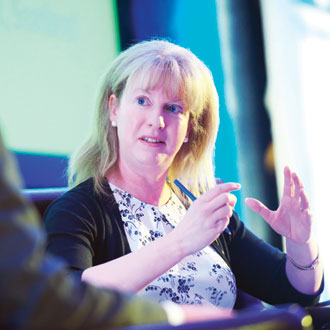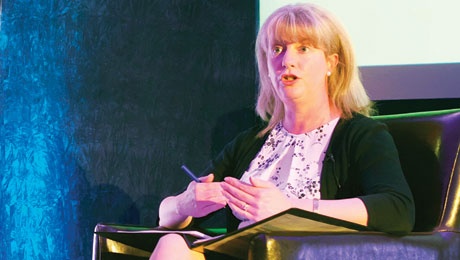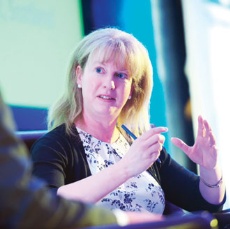‘We have to make general practice more attractive’


GPs in Scotland face major changes to their contract in less than two years’ time and the woman expected to deliver them is Shona Robison.
An SNP insider for many years – she is married to the deputy leader of the party – Ms Robison comes across as a consummate, polished politician.
But barely five months into the job, the secretary for health, wellbeing and sport is faced with what the RCGP is calling a ‘crisis’ in the profession, with some practices in Scotland having to shed patients in order to survive.
And many GP leaders north of the border are quietly concerned that the minister lacks a proper grasp of the problems in general practice.
We interview Ms Robison at the Pulse Live meeting in Edinburgh, and at a crucial stage for the profession in Scotland. But does she have the answers that GPs so desperately need?
General practice is in a pretty dire state under your Government. The RCGP is warning of a ‘crisis’, patients are struggling to get an appointment and there are massive gaps in the GP workforce. How do you plan to fix this?
I do not think there is a crisis. Yes, there are challenges and there are issues with recruitment and retention, partly because young doctors are deciding that general practice is not for them.
But I have had some productive discussions with the RCGP, the BMA and others in anticipation of the next new GP contract in Scotland in 2017.
Something quite compelling came from those discussions: we need to work towards a model that has a wider primary care team of various health professionals, to remove some of the workload from GPs. The GP would still provide services and be the clinical expert to that primary care team.
That’s quite different to the current model, but the RCGP and the BMA are telling me it is a good one to work towards.
I recognise the challenges but I don’t think it’s as grim as some of the language you are using suggests. There’s a real potential to do something quite different in primary care with GPs absolutely at the centre.
That’s the vision for 2017, but what about now?
There are no easy fixes, but one of the things we have brought forward is the £40m primary care development fund – we’ll be making an announcement about that shortly.
Without a doubt, the medium to longer term is about attracting doctors into general practice. We have to make general practice more attractive, or we’re going to be firefighting to deal with the recruitment and retention problems.
Will this additional funding go to GPs?
The proposal from my predecessor was for a one-year £40m fund, but when I came into the post in November I felt that was a bit of a short-term thing that didn’t allow us to do very much in terms of being able to help general practice, because once it’s gone, it’s gone.
So we’ve changed that to a three-year funding cycle. The profession has told us that the best way of spending that money is on support from other health professionals in general practice to relieve some of the workload.
When researching for this interview, I found most of your media comments were about A&E and the four-hour target. I struggled to find any about GP services. Has your focus slipped?
No, but I can’t set the agenda of what the media want to talk about, or what the opposition wants to talk about. But there is too much focus on hospitals and if we’re going to tackle the pressures on the acute system, we need to prevent people from going into hospital in the first place.

Before the election, the Conservatives made lots of funding promises. These will mean additional budget allocated for Scotland. What will you do with it? Will it go to general practice?
First of all, I think we need to see the colour of the money and where that’s going to come from. But what we’ve also committed to is a real-terms increase for the rest of this Parliament and the next in the health budget. It will reach £12bn for the first time. If the extra money comes true then we’ll have to make a decision about what we might do with that.
We need to make sure we’re keeping people out of hospital. Primary care has a critical role in that and there’s some really good work going on already that’s achieving really, really great results.
We need more intermediate care beds, for example, so there is an option for a GP faced with an elderly patient on a Friday afternoon who they are concerned about but who doesn’t need an acute bed.
I’d want to make sure that resource isn’t just about plugging holes, but is actually about creating a more sustainable service going forward.
Talking about integration, what will GPs’ role be in the new health and social care partnerships that are meant to start next year?
The new integrated joint boards have already come to life on 1 April – in their shadow year. They are critical.
I was a home care organiser in a previous life so I managed social care services in the north of Glasgow. We used to dream about integration in those days. Finally, about 20 years down the line, we’ve got to a position where no one will fall between two stools because of two different systems.
I know there have been issues around making sure the GP voice is around the table but it is very, very important in decisions about how resources are spent.
How strong will that voice be?
General practice will have to work out how it articulates that voice. But if primary care isn’t there as a central theme, we’ll be talking to that integrated joint board about why that is, because it won’t be a good, sustainable plan.
The health board in Clackmannanshire, for example, has managed to identify the 3% of its population that uses half the unscheduled care beds in the hospital and reduce hospital attendance dramatically for those patients by managing them in the community.
We’ve told the integrated joint boards that as an early priority, we should be identifying the 3% of people who are heavy users of the healthcare system in primary care and secondary care and I think that would be an early win for the whole system.
It’s not just about keeping people out of secondary care. What about ensuring GPs have adequate support around them in the community?
Yes, but of course the same cohort of patients that use unscheduled care services on a regular basis don’t just use A&E and hospital beds; it’ll be the same high usage of healthcare resource in all parts of the system.
Interestingly, the way they identified that group of patients was through GPs. The integrated team – GPs, geriatricians, nurses and social care staff – has managed to support that cohort of patients and actually avoid them putting pressure on the system.
And, importantly in all of this, the patients have better outcomes as well, which is also of central importance.
CV
Age
49
Family
Married with a daughter
Education
1989
MA in social sciences from the University of Glasgow
1990
Postgraduate certificate in Community Education from Jordanhill College, Glasgow
Career
2003
Elected MSP for Dundee East; became SNP spokesperson for health and social justice
2007
Made minister for public health
2011
Made minister for Commonwealth Games and sport
2014
Appointed Cabinet Secretary for Health, Wellbeing and Sport
Career high
Being appointed to her current role
Interests
Baking, supporting Dundee United football club and spending time with her daughter









